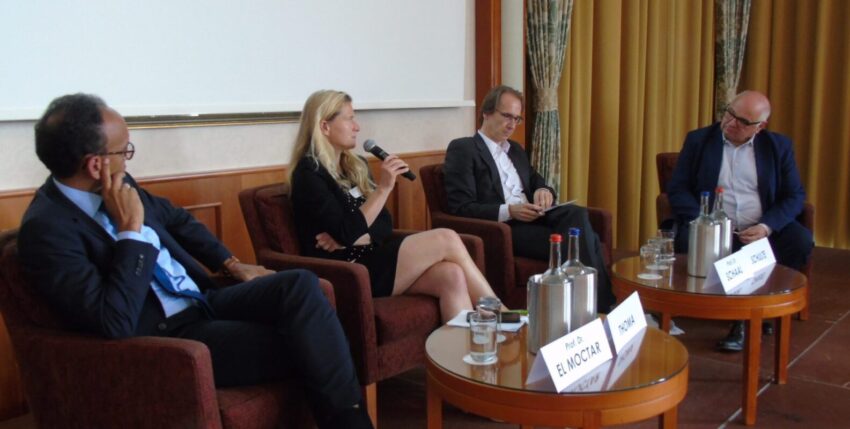Around 80 guests from politics, business, science, associations and the navy accepted the invitation of the German Maritime Institute (DMI) to the 7th Maritime Colloquium in Wilhelmshaven on 18 June under the guiding theme of "Maritime Innovation & Digitalisation". The event, which was jointly organised by DMI, griephan, the German Naval Association and Flotilla 2, was also kindly supported by the city of Wilhelmshaven. The maritime atmosphere at the ATLANTIC Hotel provided a great opportunity to catch up with old friends and make new contacts.
The President of the DMI, Vice Admiral (ret.) Hans-Joachim Stricker welcomed the guests and congratulated the Lord Mayor of the City of Wilhelmshaven Andreas Wagner 150th birthday - not his own, of course, but that of the city. And the laughter at this linguistic joke proved right from the start that this was a relaxed meeting between friends. Flotilla Admiral Ralf Kuchler, Commander of Operational Flotilla 2, addressed the topic by pointing out that the digitalisation of the Navy had basically begun 50 years ago with the commissioning of the Navy's first computer ships, namely the LÜTJENS-class destroyers, and traced the arc to the frigate 125, whose type ship "Baden-Württemberg" had been ceremoniously commissioned the day before.
Great days in Wilhelmshaven - and so a satisfied Lord Mayor did not miss the opportunity to wish the guests a successful event and good discussions. Addressing the topic, he emphasised its relevance for NATO, the EU and the European idea and concluded with the assessment "BREXIT is not an option".
Heinz Schulte, publisher of the griephan letters, introduced the panel I speakers as an experienced and, as usual, charming moderator. Prof. Dr. Gary S. Schaal from the Helmut Schmidt University of Hamburg, discussed digitalisation as a key driver of innovation in Germany and praised Germany's innovative capacity, particularly that of SMEs. He also found positive "status quo assessments" for the federal and state governments with regard to research and development. He described the vulnerability of the maritime industry - and the as yet unutilised opportunities for better networking. Lecture
Doreen Thoma, Head of Division at the Federal Maritime and Hydrographic Agency, took the audience far back in time to the beginnings of the BSH and thus spanned the arc from the start of the North German Naval Observatory to today's concept of e-navigation. The question of whether, for example, a sextant should still be on board was discussed further during the break. Lecture
Prof Dr Bettar O. el Moctar from the University of Duisburg-Essen gave a lecture focussing on inland shipping and explained the importance of future automated driving for the future-oriented job profile of inland shipping, for the economic efficiency and projects of the Rhine-Ruhr Smart Shipping Centre. Lecture
His theses were a point of discussion in the subsequent conference organised by Heinz Schulte moderated debate. The role of politics was also assessed here, which cannot accelerate as it should due to federalism and our democratic regulations. Professor Schaal's comment that we have "systemic brakes" in Germany will probably be remembered.
Rear Admiral (ret.) Ulrich Otto introduced the audience to Panel II after the break, which dealt with the opportunities and risks of digitalisation for the navy. The two speakers, Axel Leicht of Thales Germany and frigate captain Dr Robert Koch from the Cyber and Information Space Command, captivated the audience with very demanding topics and challenged them with complex issues.
Axel Leicht showed what development processes the "defence platforms" - he meant ships, aircraft and tanks - have mastered in recent decades and what breathtakingly fast development progress we can expect in the coming years. In the past, 10 per cent of the development share went to computer performance, today it is almost 40 per cent. He concluded his presentation with many examples of digital applications, not without addressing ethical aspects. Lecture
Dr Koch took the audience into a world that was completely unknown to most people by talking about the future possibilities of digital development and even formulating philosophical approaches. Whether taking photographs with the eyeball of "Man 2.0", the astonishing developments in electronic storage (who knew what a "petabyte" was before?) or real threats from Trojans, Dr Koch gave a creatively formulated presentation - especially on threats to warships. His expertise made the audience sit up and take notice and at the end one listener put it like this: "Luckily he's on our side". Lecture
In conclusion, retired Vice Admiral Hans-Joachim Stricker the speakers, supporters and organisers and then invite them to the reception.
With many good conversations in the lobby and on the terrace with a view of the lake, a successful colloquium only ended for some in the late evening hours.
Holger Schlüter








2 responses
Thanks for the article and also for providing a link to the presentations!
The sailor
Wonderful! 🙂